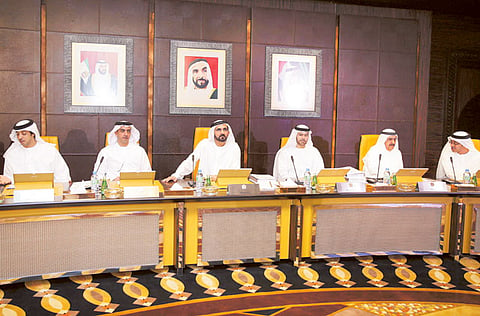UAE cabinet approves draft law on child rights
No leniency with people who violate children's rights, says UAE Vice President

Abu Dhabi: The UAE Cabinet has approved a draft federal law on children’s rights.
The draft law was cleared during the Cabinet meeting at the Presidential Palace chaired by His Highness Shaikh Mohammad Bin Rashid Al Maktoum, Vice-President and Prime Minister of the UAE and Ruler of Dubai. Shaikh Mansour Bin Zayed Al Nahyan, Deputy Prime Minister and Minister of Presidential Affairs, and Lieutenant General Shaikh Saif Bin Zayed Al Nahyan, Deputy Prime Minister and Minister of Interior, were also present.
“Every child has a right to have a safe life, constant care, and emotional and psychological stability. There will be no leniency with people who violate the rights of children — they are the future,” Shaikh Mohammad said.
As per the draft federal law, specialised child protection units with a judicial status will be set up to ensure the safety of children in situations where their safety or health is endangered in any way.
These teams will coordinate with the relevant authorities to carry out interventions in a preventive capacity or even to extend medical treatment where necessary.
“The interests of children and their needs must take precedence over anything. Their right is a duty, and it is our responsibility to cooperate and achieve it,” Shaikh Mohammad said. “The new law covers all aspects related to children’s rights, and contains mechanisms that ensure its implementation, as well as punishments that will thwart people whose morals and religious beliefs do not stop them from violating the rights of children.”
Shaikh Mohammad ordered that the law be named "Wudeema’s law" in reference to the eight-year-old girl who was allegedly murdered by her father and buried in the desert.
Senior chief prosecutor Mohammad Ali Rustom, head of Family and Juveniles Prosecution (FJP) in Dubai, said the draft law is a timely move and will assure children the full protection and preservation of their rights.
“The draft law surely contains many articles that are in favour of the children and their rights. It has also come to protect children and maintain their rights before a crime is committed or a kid is abused. It also holds everybody [parents, schools and social bodies and concerned authorities] relatively responsible for children’s protection and preservation of their rights,” he said.
“In cases of negligence or carelessness, the new draft law has come to hold everybody, who is directly or indirectly responsible for children’s protection and rights, criminally liable,” Rustom told Gulf News.
Advocate Mukhtar Gareeb, who specialises in family cases, said the draft law proposes to hold society as a whole responsible for children’s safety and security.
“All members and bodies of the society should be held responsible for the kids’ protection or the preservation of their rights and not only the parent independently. Now everybody will be held liable. Any adult who fails to report incidents wherein a child’s safety is threatened to concerned authorities could be fined Dh50,000," advocate Gareeb said.
The law seeks to protect every child regardless of religion, nationality, origin, or social class.
With regard to a child’s cultural rights, the law prohibits the possession or selling of any audio-visual publications or gaming material that may tempt a child to carry out any unlawful actions. Failure to do so will result in a fine of at least Dh100,000 and a one-year jail term.
The draft law also stresses children’s right to education and forbids any forms of violence against them in an educational institution.
It calls for protecting them from being taken advantage of or mistreated, besides acts of negligence, or forcing them into begging, and exposing them to any bodily or psychological harm.
It emphasises the importance of informing child protection specialists if children’s safety is threatened and obliges every adult to inform the specialised authority about any threats if so requested by a child. Any adult who fails in such duty will be fined Dh50,000.
Any parent applying to be the custodian of a child has to present a detailed report on his social status and criminal records, as well as a report stating that the individual applying for custodianship of the child has not committed any crimes abroad.
The draft law also stipulates that any individual using a child for photographing, recording or distributing pornographic materials will be jailed for a period of not less than 10 years.



